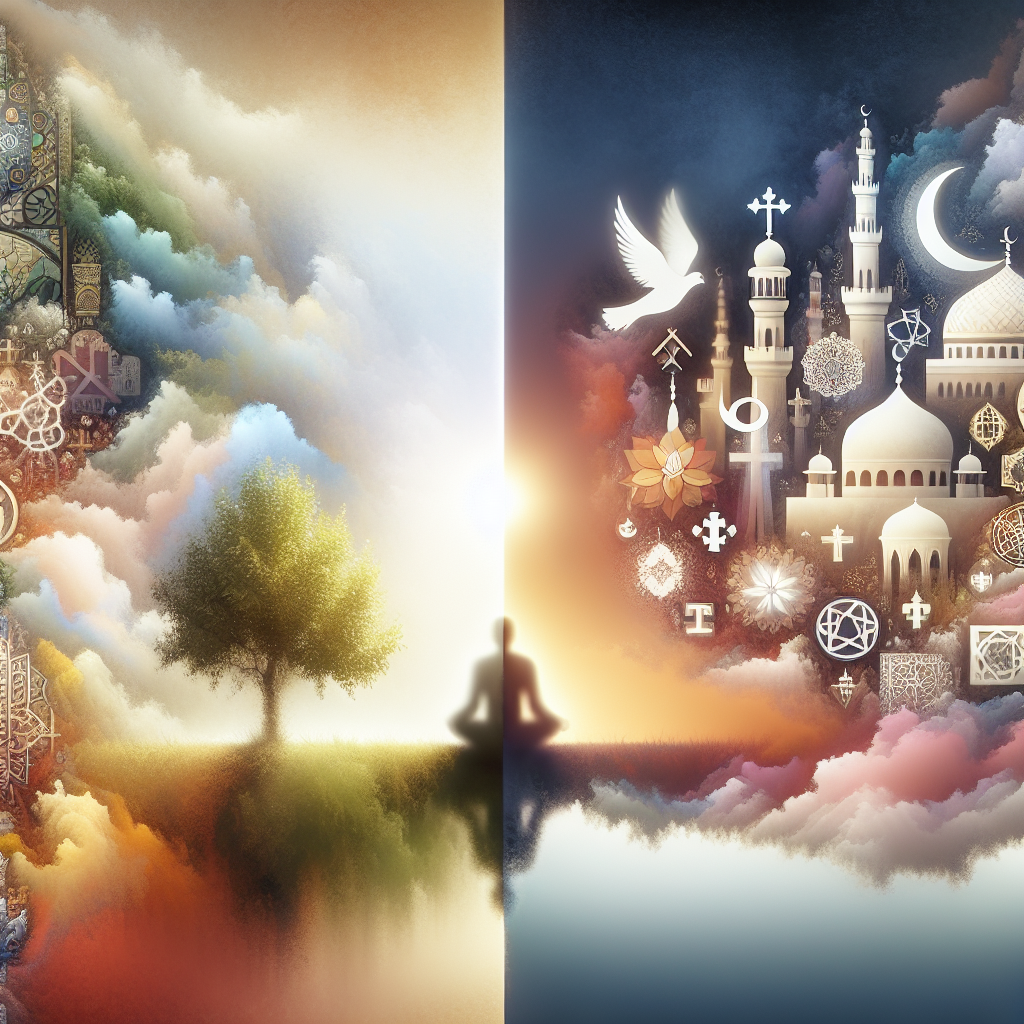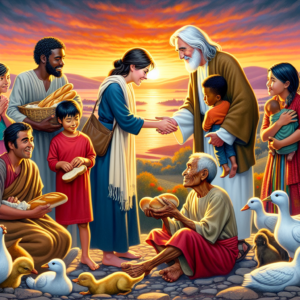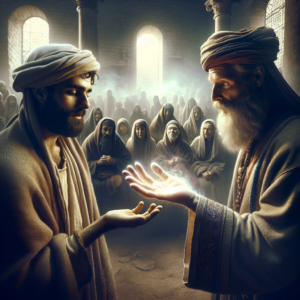Spiritual Devotional about Spirituality vs. Religion
Title: Navigating the Sea of Spirituality and Religion: A Harmonious Journey
Hello dear friends,
I hope this day finds you surrounded by love and light! Today, we’re diving into a fascinating exploration of spirituality and religion—a topic that has sparked many enlightening conversations, soul-searching moments, and personal revelations. As we navigate this sea of discovery, let’s sail with a sense of openness and excitement, letting the wisdom from the Bible illuminate our path.
Understanding Spirituality and Religion
At their core, both spirituality and religion offer pathways to connect with something greater than ourselves. They present opportunities to deepen our understanding of life’s mysteries and foster a sense of sacredness in everyday existence.
Spirituality is often characterized by an individual’s personal connection with the divine. It’s an intimate journey inward, marking an adventure into self-awareness, transformation, and growth. It invites us to explore the boundless landscapes within our souls, embracing experiences that transcend the material world.
Religion, on the other hand, typically involves the practice of specific rituals, traditions, and tenets shared within a community. It offers structured pathways through established teachings and doctrines, providing a collective experience of faith that fosters belonging and continuity.
While some may see these paths as divergent, we can instead view them as weaving together a richer tapestry of faith and understanding. After all, both spirituality and religion encourage us to live with compassion and purpose, reflecting the divine light within our hearts.
Biblical Guidance on Our Journey
The Bible offers nourishing guidance that harmonizes the principles of spirituality and religion. Consider the Apostle Paul’s message in Romans 12:2: “Do not conform to the pattern of this world, but be transformed by the renewing of your mind.” This verse encourages individual spiritual renewal while underscoring a transformative journey found in both personal spirituality and communal religious practice.
Furthermore, Hebrews 10:24-25 reminds us of the strength found in community: “And let us consider how we may spur one another on toward love and good deeds, not giving up meeting together, as some are in the habit of doing, but encouraging one another.” Here, the beauty of religious fellowship is illuminated, celebrating the shared pursuit of love and goodness.
Celebrating the Dance of Spirituality and Religion
Approaching spirituality and religion with an embracing spirit opens the door to new perspectives and enriched experiences. For the ardent seeker, spirituality offers the freedom of exploration, a canvas upon which we paint our divine encounters. Conversely, religion provides the framework and the communal scaffolding that elevates our understanding and supports us through life’s challenges.
Spiritual discipline, prayer, meditation, love, charity, forgiveness—these are the foundational stones upon which both routes rest. As Jesus said in Matthew 22:37-39, “’Love the Lord your God with all your heart and with all your soul and with all your mind.’ This is the first and greatest commandment. And the second is like it: ‘Love your neighbor as yourself.’” This profound calling to love is both the spiritual and religious heart’s purest expression that unites us all.
A Personal Reflection
Let us take a moment to imagine ourselves on a beautiful meadow beneath a vast sky. Here, spirituality is the gentle breeze that rustles the leaves, whispering wisdom and inspiration. Religion is the sturdy trunk of the towering tree offering shade and structure to our journey. Both are part of the same divine landscape, reminding us of the breadth and depth of God’s creation and love.
As you walk your unique journey, may you find joy in the harmony of your spiritual and religious experiences. Let them empower you to share your light with the world, nurturing love, peace, and understanding in every step you take.
Blessings and luminous peace,
[Your Name]
Explore and dig up answers yourself with our BGodInspired Bible Tools! Be careful – each interaction is like a new treasure hunt… you can get lost for hours 🙂
Q&A about Spirituality vs. Religion
Certainly! Here’s a Q&A exploring the distinctions and connections between spirituality and religion:
Q1: What is the primary difference between spirituality and religion?
A1: Spirituality is generally seen as an individual’s personal and subjective experience of the divine or sacred. It often involves personal growth, self-realization, and a deeper connection with the universe or certain beliefs about life, death, and purpose. Religion, on the other hand, typically involves organized institutions with established doctrines, rituals, and codes of conduct. It provides a communal framework for spiritual practices and beliefs.
Q2: Can someone be spiritual but not religious?
A2: Yes, a person can be spiritual without adhering to the doctrines of organized religion. This might involve exploring various spiritual practices such as meditation, yoga, or contemplation, and forming beliefs based on personal experiences rather than religious teachings.
Q3: How do religions encompass spirituality?
A3: Religions often include elements of spirituality as part of their core practices. They provide their followers with spiritual guidance, rituals, and teachings designed to deepen believers’ spiritual lives and foster a connection with the divine. Religions often articulate the spiritual experience in structured ways, framing how individuals should relate to the sacred.
Q4: Is one approach more valid than the other?
A4: Neither approach is intrinsically more valid than the other. Personal preferences, cultural contexts, and individual experiences all play roles in determining whether someone leans towards spirituality, religion, or a blend of both. What matters is the authenticity of the experience and whether it brings meaning, peace, and growth to the individual.
Q5: How do spirituality and religion address the concept of morality?
A5: Religion typically provides a set of moral guidelines or commandments believed to be divinely inspired, which govern ethical behavior and decision-making. Spirituality, while it can also inform moral reasoning, often emphasizes personal moral development and intuition, fostering a sense of ethical conduct that may not be bound by specific doctrine but arises from personal insight and empathy.
Q6: Can spirituality and religion coexist?
A6: Yes, spirituality and religion can coexist and complement each other. Many religious individuals also engage in personal spiritual practices that enrich their faith life, while some spiritual individuals might find value in the traditions or community aspects of religion. It is possible to draw from both realms to construct a fulfilling and comprehensive belief system.
Q7: What challenges arise from distinguishing between spirituality and religion?
A7: One challenge is the potential for misunderstanding and miscommunication between individuals or groups identifying strictly with one over the other. Additionally, misconceptions may arise, viewing spirituality as lacking discipline or seeing religion as too dogmatic. Bridging these distinctions requires openness and dialogue to appreciate the unique contributions both spirituality and religion bring to human experience.


